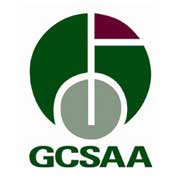Golf Course Superintendents Association of America funds $127,500 for new turfgrass research in 2019
Grants support eight new turfgrass research projects
Research grants from the Golf Course Superintendents Association of America (GCSAA) are supporting eight new research projects this year at universities across the country.
The projects, which were selected by a committee that included two members of the GCSAA board of directors, superintendents, university researchers and the research director of the USGA Green Section, will receive a total of $127,500 from a block grant to GCSAA by the Environmental Institute for Golf, GCSAA’s philanthropic organization.
The new research projects are:
- Strategies to reduce winter-related injury and spring dead spot of bermudagrass fairways and tees in marginal regions of adaptation; Joseph Roberts, Ph.D., University of Maryland. Co-funded by the Mid-Atlantic AGCS, Eastern Shore AGCS and Mid-Atlantic Sports Turf Managers Association.
- Strategies to reduce winter-related injury and spring dead spot of bermudagrass fairways and tees in marginal regions of adaptation; David McCall, Ph.D., Virginia Tech. Co-funded by the Mid-Atlantic AGCS, Virginia GCSA and Virginia Turfgrass Foundation.
- Playing surface effect of surfactants on creeping bentgrass putting greens; Joseph Young, Ph.D., Texas Tech University. Funded through the EIFG’s Mark Kizziar Research Grant, which supports work that will help produce well-conditioned golf courses while minimizing consumption of water. Co-funded by the West Texas GCSA, North Texas GCSA, Central Texas GCSA, and Lone Star GCSA.
- Risk Thresholds for Lance Nematodes on Ultradwarf Bermudagrass; William T. Crow, Ph.D., University of Florida. Funded through the EIFG’s Dr. Michael J. Hurdzan Endowment, which supports environmental research on golf courses. Co-funded by the Florida GCSA.
- Soil water content and ethylene effects on Annual bluegrass acclimation to and survival or winter; Emily Merewitz, Ph.D.., Michigan State University. Funded through the EIFG’s Aquatrol’s Robert A. Moore Endowment, which supports research for optimizing the growing environment for golf course turf, while minimizing inputs of water, fertilizer and pesticides. Co-funded by the Michigan Turfgrass Foundation.
- Zoysiagrass Seedhead Development and Suppression; Jack Fry, Ph.D., Kansas State University. Co-funded by the Heart of America GCSA and Kansas Turfgrass Foundation.
- Exploring Phosphite Fertilizer for Turfgrass: Fungicide or Fertilizer?; Beth Guertal, Ph.D., Auburn University. Co-funded by the Alabama GCSA and Alabama Turfgrass Research Foundation.
- Turfgrass Plant Water Status Influence on Herbicide Phytotoxicity and Efficacy; Ryan Goss, Ph.D.; New Mexico State University. Co-funded by the Rio Grande GCSA.
About GCSAA and the EIFG
The Golf Course Superintendents Association of America (GCSAA) is a leading golf organization in the United States. Its focus is on golf course management, and since 1926 GCSAA has been the top professional association for the men and women who manage golf courses in the U.S. and worldwide. From its headquarters in Lawrence, Kan., the association provides education, information and representation to more than 18,000 members in more than 78 countries. The association’s mission is to serve its members, advance their profession and enhance the enjoyment, growth and vitality of the game of golf. Visit GCSAA at www.gcsaa.org, or find us on Facebook or Twitter. Visit our industry-leading magazine at GCMonline.com.
The Environmental Institute for Golf is the philanthropic organization of the GCSAA. Its mission is to foster sustainability through research, awareness, education, programs and scholarships for the benefit of golf course management professionals, golf facilities and the game. Visit EIFG at www.eifg.org, or find us on Facebook or Twitter.
Contact:
Angela Hartmann, Associate Director, Communications
Phone: 800-472-7878, ext. 3647 or 785-393-1361 (cell)
ahartmann@gcsaa.org






